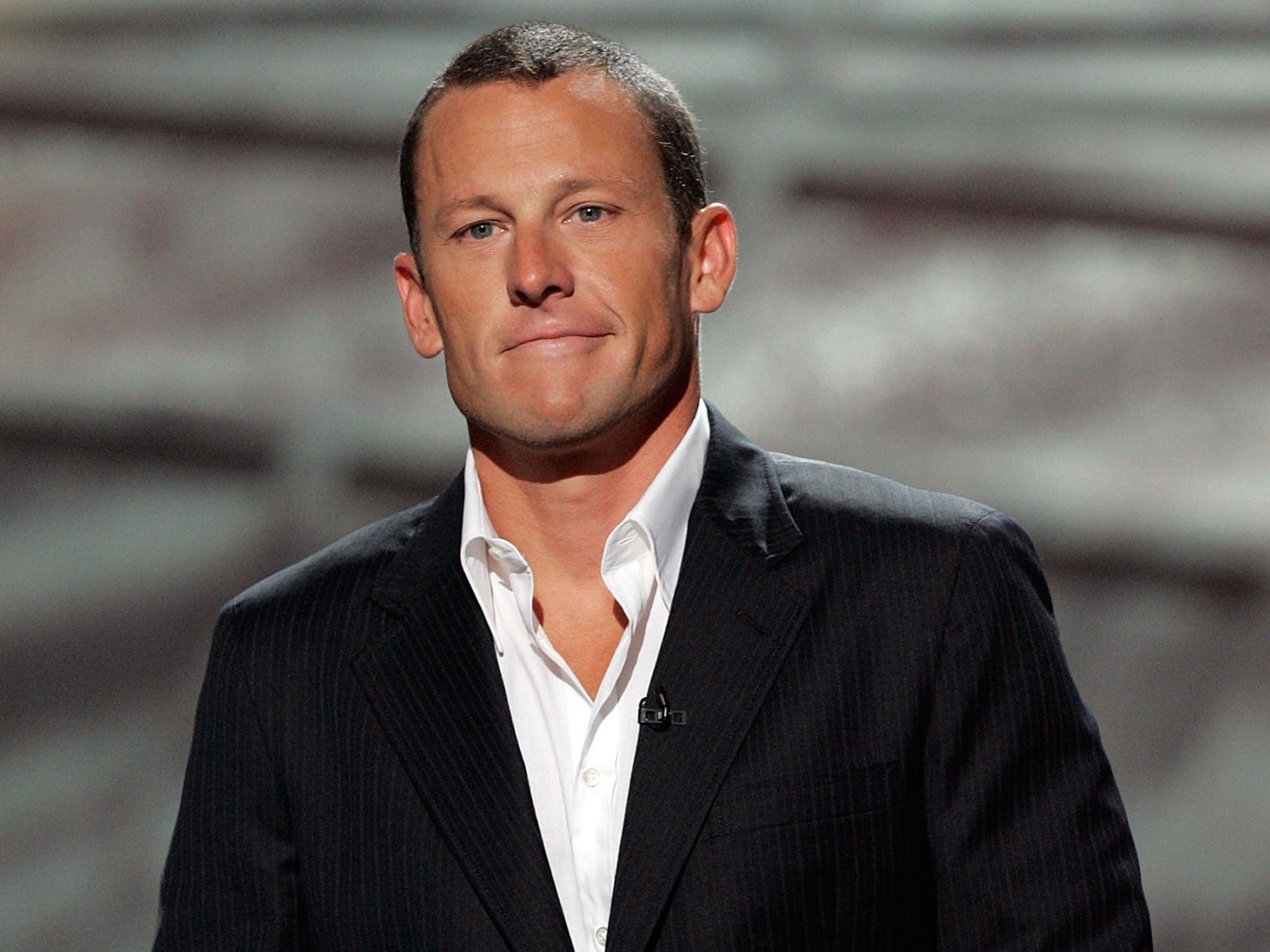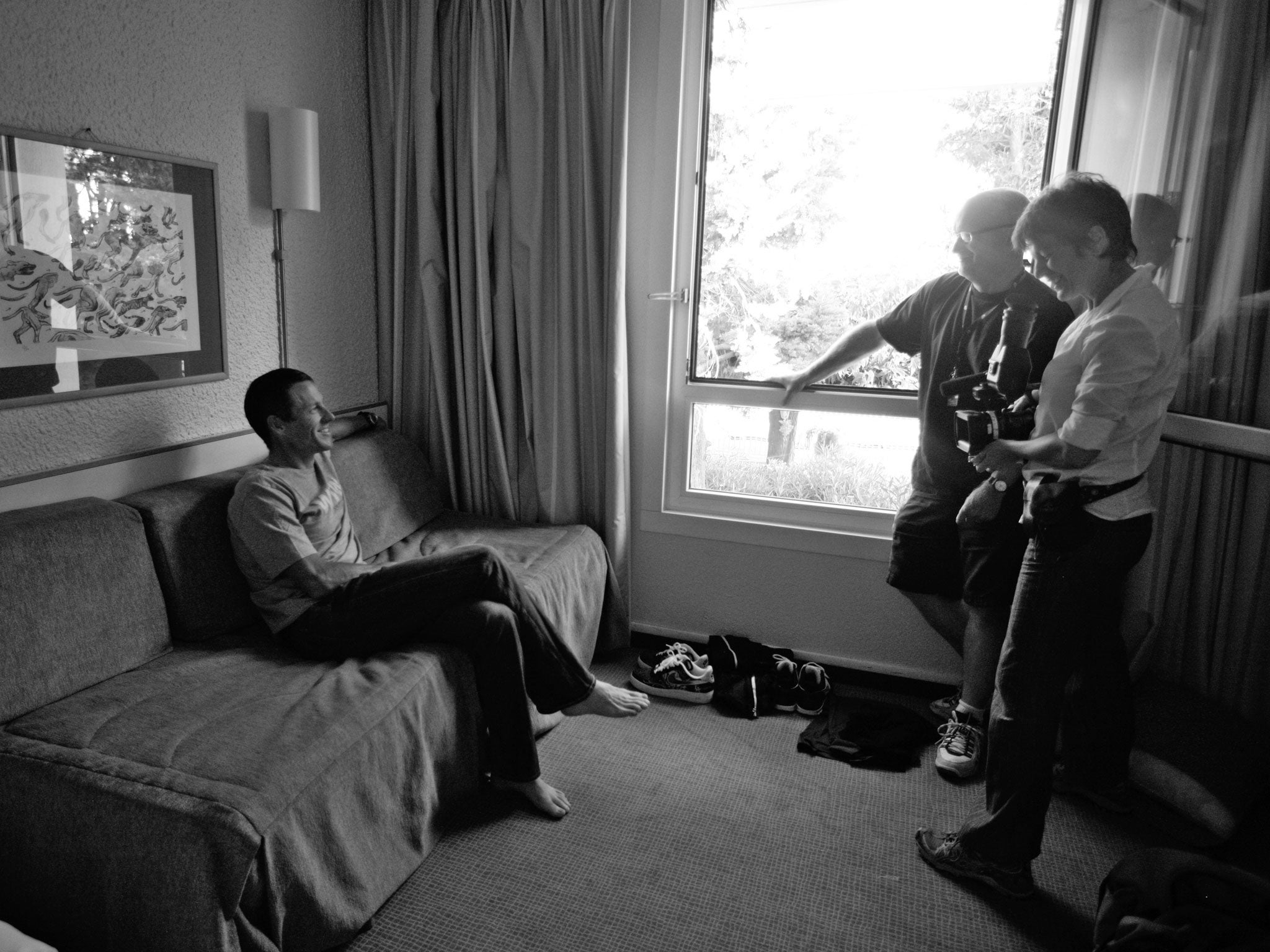My 'tour de Lance': Forthcoming Lance Armstrong documentary paints a complex picture
The Oscar-winning director and erstwhile Armstrong fan Alex Gibney explains why his behind-the-scenes documentary profile of the drug-cheat cyclist is far more complex than a total condemnation

As perhaps the most eagerly awaited documentary of 2014, it would be no surprise if The Armstrong Lie – and its Oscar-winning director – came down hard on the cyclist who doped his way to titles, adoration and fame. Yet speaking to The Independent, the film-maker Alex Gibney surprisingly mounts a defence, albeit a partial one, of the disgraced Tour de France winner Lance Armstrong.
Gibney’s new feature, released in the UK this month, follows Armstrong during his comeback at the 2009 Tour de France. When he started the film, Gibney was a self-confessed Armstrong supporter.
Asked whether he now felt “shame” at his collusion with an athlete who admitted to drug taking after years of denial, Gibney replies: “Mild embarrassment might be more accurate. Look, I got caught up. I wanted to reflect that frankly in the overall film. That’s one of the reasons why I put myself in it.”
The director acknowledges that he was “inside the bubble, embedded in the Armstrong army” and that his initial perspective on the sportsman “was probably too rosy”.
Inevitably, there has been a huge backlash against Armstrong since he finally admitted to his doping guilt in an interview with Oprah Winfrey a year ago. The British director Stephen Frears is currently at work on a film about Armstrong based on Seven Deadly Sins, the book by the cyclist’s long-time critic David Walsh.
As the very title of his own documentary now makes clear, Gibney feels let down by Armstrong’s dishonesty. However, he has also calls for some perspective on the cyclists misdeeds.
Even in 2009, Gibney says, he was well aware of the allegations against Armstrong. His film was originally going to be called The Road Back. “That was a double title. It was a comeback title but it was also a way of saying all roads lead back to the past.” At the time, he thought Armstrong was trying to win the Tour de France “clean so that he could put an end to doubts about the past”.
Before Armstrong’s first Tour victory in 1999, the American cyclist was regarded as a good one-day racer who couldn’t ride in the mountains. He had been in several Tours prior to 1999 without shining. To some, this was obvious evidence that his sudden transformation was down to drugs. But, says Gibney, “that neglects one thing”.
“We now know even from Armstrong’s own admission that he was doping in ’94. Well, that’s five years before... If the dope was so good and all he had to do was dope to win, then he should have won in ’94.”
Gibney’s own theory, which Armstrong disputes, is that the cyclist had extra motivation after recovering from cancer. He was also paying very close attention to the advice of the doctor, Michele Ferrari. The doctor realised that Armstrong had extraordinarily strong lungs. Ferrari’s training regime put more pressure on the cyclist’s heart and lungs and encouraged the cyclist to change to a lower gear and pedal faster. Combined with the EPO – a hormone that increases red blood cell count – this made him unbeatable.

Armstrong is reportedly sanguine about Gibney’s use of the word “lie” in the title of his film. The cyclist finally accepts that he did lie. The film-maker and the cyclist had a conversation recently in which Gibney said: “I can accept you’re the best of a bad era but the enormity of your lie and the way you used the power of the story to attack people telling the truth, I am going to be tough on that.”
The cyclist is currently mired in law suits. Gibney predicts that he will contest these in his usual feisty way. “That’s what Lance Armstrong knows how to do. He likes to fight. He is comfortable fighting.”
In the documentary, we see Armstrong at home with his children as doping inspectors turn up regularly at the door. “Look, whenever the camera is on, he is performing to some extent,” Gibney suggests. However, the director points out the poignancy in Armstrong having his blood taken by inspectors in front of his kids.
“The cancer thing is real,” the director says of Armstrong’s work with his cancer charity Livestrong. “I heard any number of stories where he reached out to people personally. I was in his presence a few times when he would get calls and say ‘Sorry, I’ve got to take this’ – because he would be advising someone who had a certain kind of cancer, helping them figure out what to do and giving them some sense of support. That was real!”
In his own film-making career, Gibney has made several documentaries about powerful men with feet of clay, leading businessmen and politicians, whistleblowers and Catholic priests among them.
“As someone says in the film, this is not a film about doping, it’s a film about power,” Gibney reflects. “A lot of the films I do are about people with power and how they abuse their power... it’s this psychology of people who think they are entitled to do bad because they are fundamentally on a mission that is good.”
Gibney doesn’t condemn Armstrong altogether. What disappoints him, though, is the way that cheating destroys the purity of sport. “I think that’s the sad part of it... you don’t want there to be doubt. You want to believe in a moment where an athlete extends themselves in some extraordinary way that transcends their physical capacity to do something magnificent. You want to believe. That’s tarnished by doping.”
Join our commenting forum
Join thought-provoking conversations, follow other Independent readers and see their replies
Comments
Bookmark popover
Removed from bookmarks